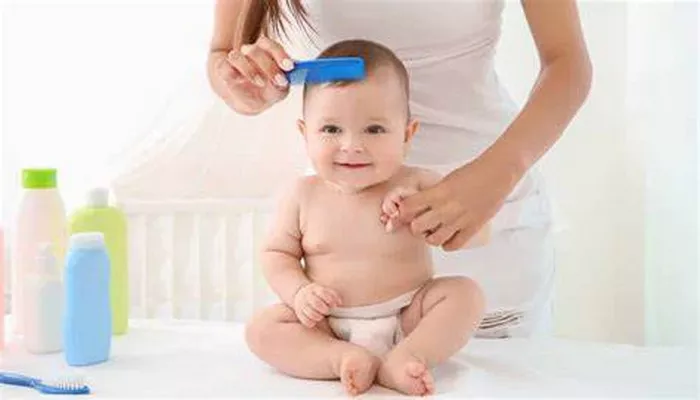Caring for a baby’s delicate hair and scalp can be a challenging task for new parents. At three months old, a baby’s scalp and hair are incredibly sensitive and require gentle handling and appropriate products. This article will explore the best practices and products for caring for your three-month-old’s hair, ensuring it remains healthy and soft.
The Importance of Gentle Hair Care
A baby’s scalp is much thinner and more sensitive than an adult’s. It is important to use gentle products that won’t irritate or harm their skin. Harsh chemicals and strong fragrances can cause dryness, irritation, or allergic reactions. Opt for mild, hypoallergenic, and fragrance-free products designed specifically for infants.
See Also: Different Types of Similac Formula: What You Need to Know
Choosing the Right Products
1. Baby Shampoo
When selecting a baby shampoo, look for one that is:
Tear-free: Babies often squirm during bath time, and tear-free formulas prevent eye irritation.
Hypoallergenic: This reduces the risk of allergic reactions.
Free from harsh chemicals: Avoid sulfates, parabens, and phthalates.
Brands like Aveeno Baby, Johnson’s Baby, and Cetaphil Baby offer gentle shampoos suitable for a three-month-old.
2. Natural Oils
Natural oils can be beneficial for moisturizing a baby’s scalp and preventing dryness. Some safe options include:
Coconut Oil: It has antimicrobial properties and is great for moisturizing the scalp.
Olive Oil: A natural moisturizer that can help with cradle cap.
Almond Oil: Rich in vitamins A, B, and E, it nourishes the scalp and hair.
3. Baby Hair Lotion
Baby hair lotions are formulated to be gentle on a baby’s scalp. They help in moisturizing and detangling hair, making it easier to manage. Look for lotions that are free from artificial fragrances and colors.
Hair Care Routine
Bath Time Hair Care
Frequency: You don’t need to wash your baby’s hair every day. Two to three times a week is sufficient.
Technique: Use a small amount of baby shampoo, gently massaging it into the scalp with your fingertips. Rinse thoroughly to avoid any residue that could cause dryness or irritation.
Post-Bath Care
After bathing, gently pat your baby’s head dry with a soft towel. Avoid rubbing, as this can cause damage to the delicate hair and scalp.
Moisturizing
If your baby’s scalp appears dry, you can apply a small amount of natural oil or baby lotion. Use your fingertips to gently massage the oil into the scalp, which can also help stimulate hair growth.
Dealing with Common Baby Hair Issues
Cradle Cap
Cradle cap is a common condition in infants, characterized by flaky, crusty patches on the scalp. While it’s not harmful, it can be unsightly. To manage cradle cap:
Gentle Shampooing: Use a mild baby shampoo to keep the scalp clean.
Soft Brushing: Use a soft baby brush to gently loosen the flakes.
Moisturizing: Apply a small amount of natural oil, like coconut or olive oil, to the affected area to soften the scales.
Dry Scalp
A baby’s scalp can become dry, especially in colder weather. To combat dryness:
Limit Bathing: Reduce the frequency of baths to prevent stripping natural oils.
Use a Humidifier: Adding moisture to the air can help keep your baby’s skin and scalp hydrated.
Apply Natural Oils: Use a small amount of natural oil to moisturize the scalp.
Safe Styling Tips
At three months old, your baby’s hair might be too fine and sparse for styling, but there are still ways to keep it neat and tidy:
Avoid Hair Ties: Hair ties can pull on delicate hair, causing breakage. Instead, use soft headbands if needed.
Brush Gently: Use a soft-bristled baby brush to gently detangle hair and keep it smooth.
Protect from Elements: Protect your baby’s scalp from the sun with a hat when outdoors.
When to Seek Professional Advice
If you notice persistent scalp issues like severe cradle cap, redness, or signs of infection, it’s important to consult a pediatrician. They can provide guidance and recommend appropriate treatments to ensure your baby’s scalp remains healthy.
Conclusion
Caring for your three-month-old’s hair involves using gentle products, establishing a mild hair care routine, and addressing common scalp issues with safe, natural solutions. By following these tips, you can keep your baby’s hair and scalp healthy and soft. Remember, every baby is different, and what works for one may not work for another, so be attentive to your baby’s needs and adjust their hair care routine accordingly.


